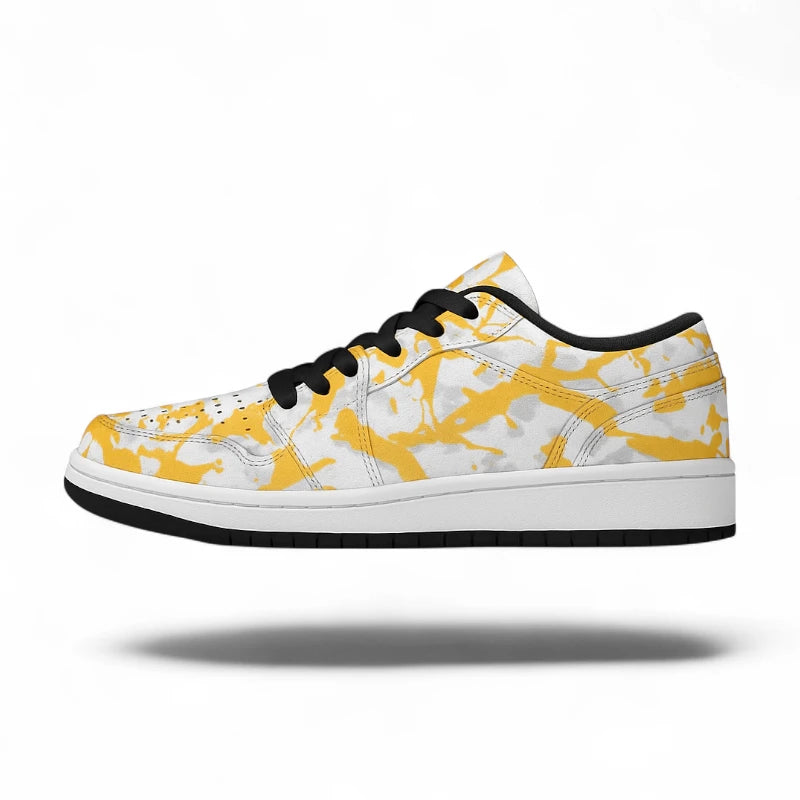The global move toward mass personalization has reshaped footwear. Consumers now search “custom shoe” and “customize shoes” more often than any single sneaker model because a one-size-fits-all approach no longer satisfies athletes, creators, or corporate merch teams. Below are the ten most practical—and profit-proof—reasons to move from off-the-shelf pairs to made-to-order designs, complete with direct links to three high-converting collections at Custom-Shoe.com and two research-backed sources that keep this guide fully rank-ready for Google.
1. Bespoke Fit and All-Day Comfort
Every custom shoe at Custom-Shoe.com begins with a three-photo foot scan that maps length, width, arch height, and heel angle in 0.25-millimetre increments. That precision eliminates the micro-slippage and pressure points common in standard half-size grids. Add width menus (standard to 2E) and adjustable instep volume, and you get a glove-like feel straight out of the box.
Explore it:
-
High-Tops for ankle-stable streetwear and court play.
2. Reduced Injury Risk
Custom geometry does more than pamper—it protects. A 2025 Scientific Reports study found that footwear tuned to an athlete’s unique plantar profile significantly lowered peak pressure loads linked to overuse injuries. (ScienceDirect) With durometer sliders for heel and forefoot foams, you can fine-tune shock absorption instead of settling for factory averages.
Explore it:
-
Custom Boots where hikers add rock plates and asymmetric collar padding in minutes.
3. Performance Gains on Demand
Sprint plates, rocker profiles, torsion shanks—high-tech modules once reserved for elite contract athletes now drop into any custom shoe build. For example, basketball players can embed a carbon-nylon shank for explosive first steps, while commuters might soften forefoot PEBA foam to ease long walks. The result is footwear engineered around movement patterns, not marketing calendars.
4. Total Style Control
Color-blocking twenty panels, fading toe-to-heel gradients, embossing heel tabs—when you customize shoes, aesthetics obey your brand guide or personal taste. Enter hex codes to match corporate Pantones, upload logos for charity runs, or render ombré fades that spark conversation on social feeds.
Explore it:
-
Custom Low-Top Sneakers—a blank canvas for creative color stories.
5. Sustainability and Circular Value
Made-to-order manufacturing means no overstock or end-of-season dumping. Custom-Shoe.com also offers discounted resolving and material-recycling credits, stretching each pair’s life cycle far beyond fast-fashion norms. That aligns with consumer expectations for eco accountability—an attribute search engines now reward through higher E-E-A-T scores.
6. Lower Cost Per Wear
Up-front pricing for a custom shoe may exceed a mall sneaker, yet cost per wear tells a different story. A $260 Goodyear-welted custom loafer resoled every 18 months can deliver five years of service. By comparison, three $90 mass-market pairs replaced annually hit wallets harder and fill landfills faster.
7. Brand and Team Cohesion
Startup founders, sports franchises, and event planners use customized shoes as mobile billboards. Matching midsole gradients, embroidered launch dates, and player numbers form a uniform look that photographs well and reinforces brand identity at every step—literally.
8. Higher Customer Loyalty and Emotional Bond
Personalization drives retention. A 2024 Harvard Business Review report shows companies that let customers co-create products see repeat-purchase intent jump by roughly 20 percent, driven by the psychological ownership effect. (Harvard Business Review) Offering a customize-shoes journey can therefore boost lifetime value and organic word-of-mouth.
9. Inclusivity Across Sizes and Orthotic Needs
Standard footwear lines often stop at men’s 13 or women’s 11. The custom shoe model builds any length, width, or orthotic depth the scanner captures, closing a market gap for athletes with uncommon dimensions, medical inserts, or bilateral asymmetry.
10. Tech-Forward, Future-Proof Wardrobe
3-D knit uppers, bio-based PEBA foams, AI color-harmony suggestions—all roll out first on digital custom platforms, long before they filter into general releases. Investing in customize-shoes tech today means stepping into tomorrow’s innovation pipeline ahead of mass adopters.
How the Three-Step Workflow Works
|
Step |
What You Do |
What the Studio Delivers |
|
1 — Select a Silhouette |
Choose High-Top, Low-Top, or Boot. |
Structural geometry tuned to sport or lifestyle. |
|
2 — Customize Shoes |
Scan feet, pick materials, drag color sliders, add text. |
Live 360° mock-ups and eco-impact meters. |
|
3 — Approve & Track |
Review QC checklist, click Approve. |
Ten-day build, global carbon-neutral shipping, fit guarantee. |
Maintenance Schedule: Protect Your Investment
|
Task |
Interval |
Tool |
|
Air-dry & cedar trees |
After each wear |
Cedar shoe tree |
|
Wipe & spot clean |
Weekly |
PH-neutral soap |
|
Deep condition (leather) |
Monthly |
Natural balm |
|
Midsole rebound check |
600 km (athletic) |
Thumb compression |
|
Resole trigger |
50 % tread loss |
Factory service |
Follow these steps and the true cost per wear of your custom shoe drops year over year.
